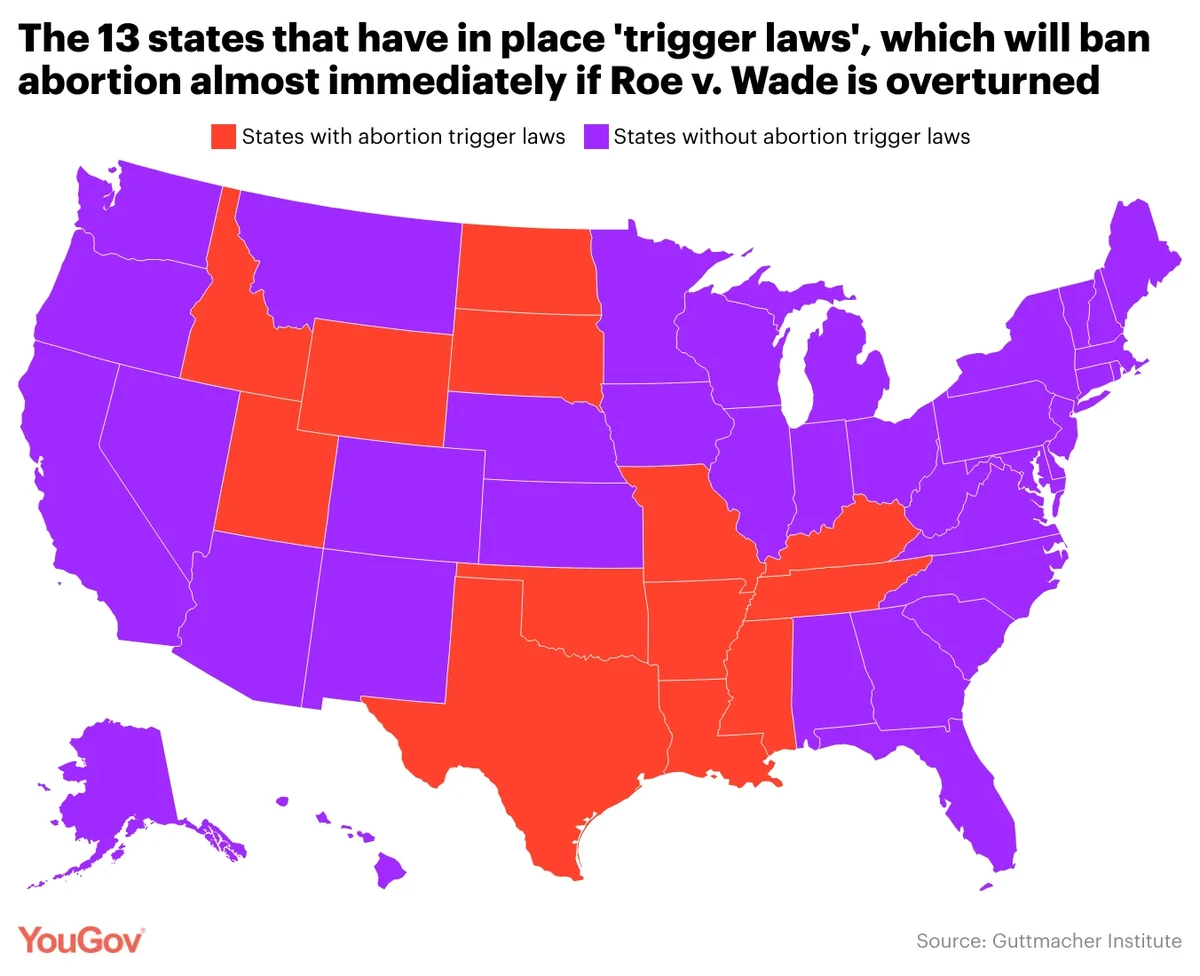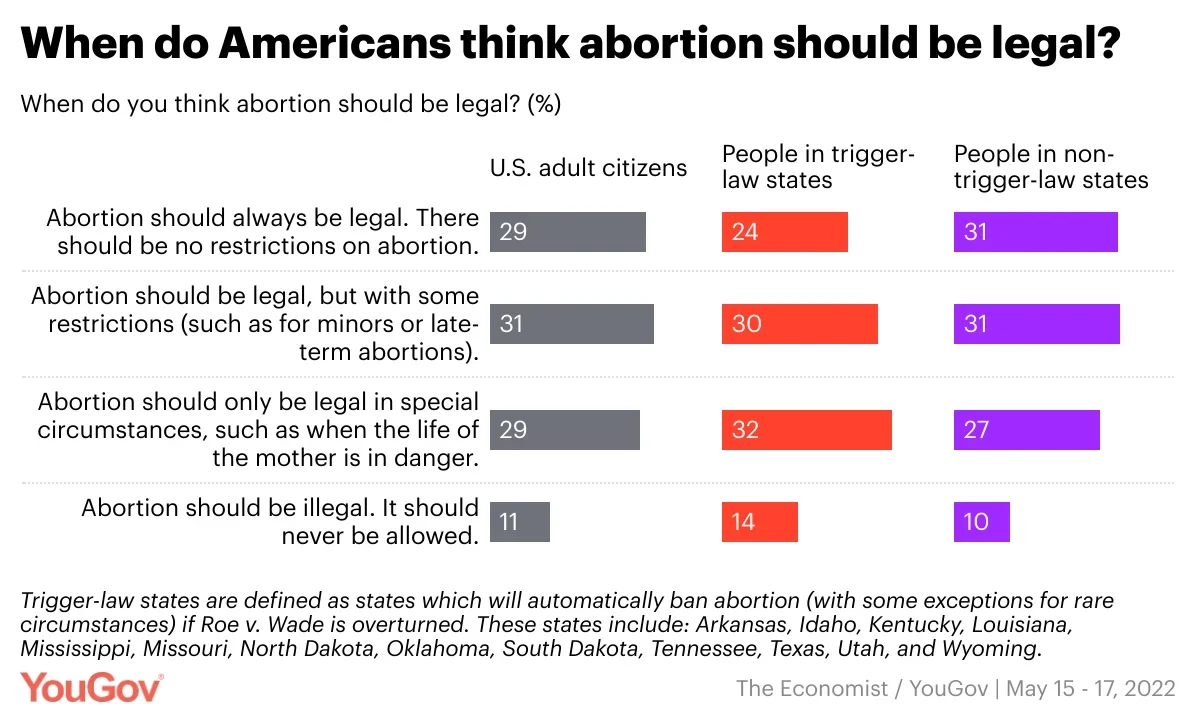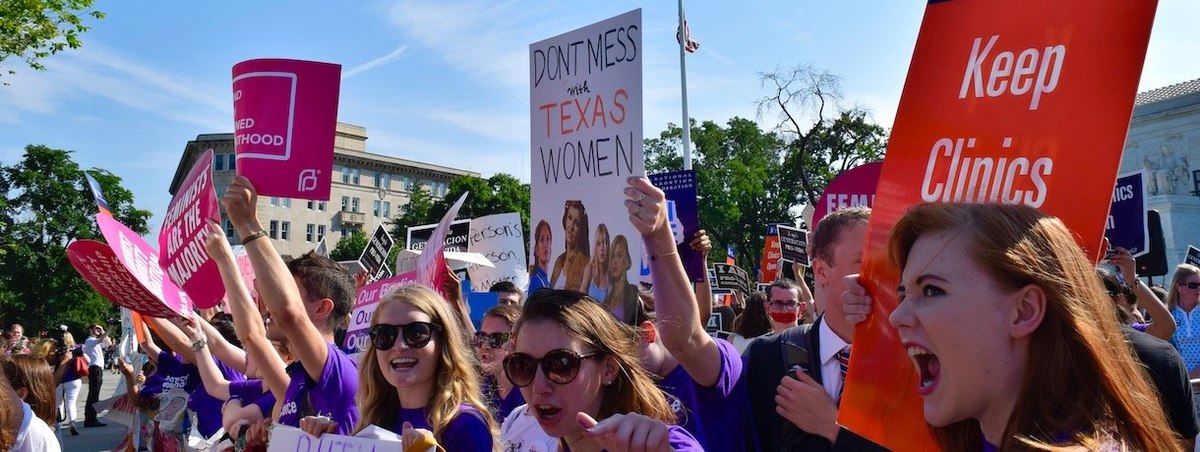If the landmark case Roe v. Wade is overturned by the U.S. Supreme Court, 13 states have laws in place that will automatically ban abortion in the first and second trimesters of pregnancy. Using data from the latest Economist/YouGov poll, we examine attitudes on abortion among people who reside in these states, also referred to as “trigger-law states,” and compare them to opinions of people in states without such restrictive laws. The trigger-law states are Arkansas, Idaho, Kentucky, Louisiana, Mississippi, Missouri, North Dakota, Oklahoma, South Dakota, Tennessee, Texas, Utah, and Wyoming.

Americans who live in states that plan to automatically restrict abortion if Roe v. Wade is overturned are more likely than people who don’t to say that it’s difficult for women in their state to get an abortion (38% say this in trigger-law states, while 11% do in other states). They also are more likely to say it has become increasingly difficult to get an abortion in their own state throughout the past year (31% say this, vs. 13%). A majority of Americans living in trigger-law states (57%) say that people seeking abortions should be allowed to leave their state to receive an abortion in a state with less restrictive laws (something Missouri legislators are considering trying to ban). Only 24% say they should not be allowed to.
Do Americans who live in states that plan to restrict abortion agree with their states’ looming restrictions? The results from our latest survey suggest that views on abortion among people in trigger-law states are generally similar to the views of people living in states that intend to enact fewer restrictions if Roe is struck down. For instance, over half of Americans in trigger-law (54%) and non-trigger-law states (62%) say abortion should always be legal or legal with some restrictions. Few people in either group of states say abortion should be illegal and never allowed (14% in trigger-law states and 10% in others).

When asked at what specific stage of pregnancy abortions should be banned, people in trigger-law states are a little more likely to say it should be banned at all stages (24% say this) than are people living in states without trigger laws (17%). They also are a little less likely to say abortion should never be banned (23% of people in trigger-law states say this vs. 30% of others). Majorities in each group of states, however, fall somewhere in between these two extremes: 53% of people in both trigger-law and non-trigger-law states agree that abortion should be legal for the first six weeks and not after the first six months, with some disagreement in between.
In addition to considering time limits, some people believe access to abortion should be determined based on the circumstances of the patient. Our data shows that people in trigger-law states are slightly less likely than people not in these states to say abortion should be permitted under a variety of extenuating circumstances. For most of the nine scenarios asked about, the gap in opinion between people residing in and out of trigger-law states is less than 10 percentage points, and on each of the nine scenarios the gap is less than 15 percentage points. Majorities of people in each set of states believe abortion should be legal in cases where a woman’s life is endangered, where the pregnancy resulted from rape or incest, or where the baby has a disorder resulting in little or no life expectancy. The largest gap between people living in and out of trigger-law states is on the question of whether a married woman who doesn’t want more children should be permitted to have an abortion; 31% of people in trigger-law states support allowing this, compared to 45% of people in other states.
In one trigger-law state (Louisiana), a bill was recently introduced that would allow prosecutors to charge a person with homicide if they receive an abortion. In our survey, less than one-third of Americans who live in trigger-law states agree that women who have abortions in violation of state laws should be charged with murder.
The relatively small gaps in abortion opinion between trigger-law states and other states are consistent significant but not overwhelming gaps in political affiliation between those states. While trigger-law states are generally controlled by Republican legislatures and governors, the share of people living in those states who are Republican is 33%, compared to 26% who are Democrats; those figures are 25% and 38% in the other states. Republicans are more likely than Democrats to oppose abortion being legal. A YouGov study based on surveys of more than 250,000 people in 2020 and 2021 similarly found relatively small differences on abortion opinion between states – including those with laws restricting abortion.
Other findings on abortion from the latest Economist/YouGov poll:
- Since the leak of Supreme Court Justice Samuel Alito’s draft decision overturning Roe v. Wade, the 1973 decision that legalized abortion nationwide, Democrats have increased their concern about abortion.
- In this week’s Economist/YouGov Poll, 58% of Democrats say abortion is a “very important” issue for them, 18 points higher than the share of Republicans who say this (40%). One in 10 Democrats say it is their “most important issue.” Just 3% of Republicans say the same.
- Do Americans think that overturning Roe v. Wade will impact their access to healthcare? In our latest survey, 13% say the Supreme Court overturning Roe will impact their ability to get the health care they need. Younger Americans and Democrats are among the most likely to say this decision would impact their ability to get health care.
- There is little or no gender difference on this question, though Americans under 45 are more likely to say it would impact them than people 45 and older are. Among Democrats under 45, more than one-third of men and women expect an impact.
- Would Americans be willing to support political candidates who hold certain views on abortion?
- 28% of Americans say they could support a candidate who supports a woman’s right to an abortion even in the third trimester, while 46% say they could not support a candidate who holds this view.
- 21% of Americans say they could support a candidate who opposes a woman’s right to an abortion even in cases of rape and incest, while 54% say they could not support a candidate who holds this view.
- Where do Americans think President Joe Biden stands on the issue of abortion?
- Most Americans say that Biden believes abortion should always be legal (35%) or legal with some restrictions (26%). Fewer think Biden believes abortion should only be legal in special circumstances (10%) or should always be illegal (4%).
- We also compared people’s own views on abortion to their perceptions of Biden’s views on the subject. While most groups agreed that Biden believes abortion should usually be legal, each specific group also to some extent projected their own opinions onto his.
- Most people who say abortion should always be legal believe that Biden also believes it should always be legal (51% say this).
- Most people who believe abortion should be legal but with restrictions also mostly believe Biden thinks it should be legal but with some restrictions (52% say this).
- People who say abortion should be illegal or only legal in special circumstances are most likely to say Biden believes abortion should always be legal (compared to other response options), though a disproportionate share of each of these groups also believe Biden agrees with their own respective stances.
— Linley Sanders and Carl Bialik contributed to this article
This poll was conducted on May 15 - 17, 2022, among 1,500 U.S. adult citizens. Explore more on the methodology and data for this Economist/YouGov poll.
Image: Gayatri Malhotra













